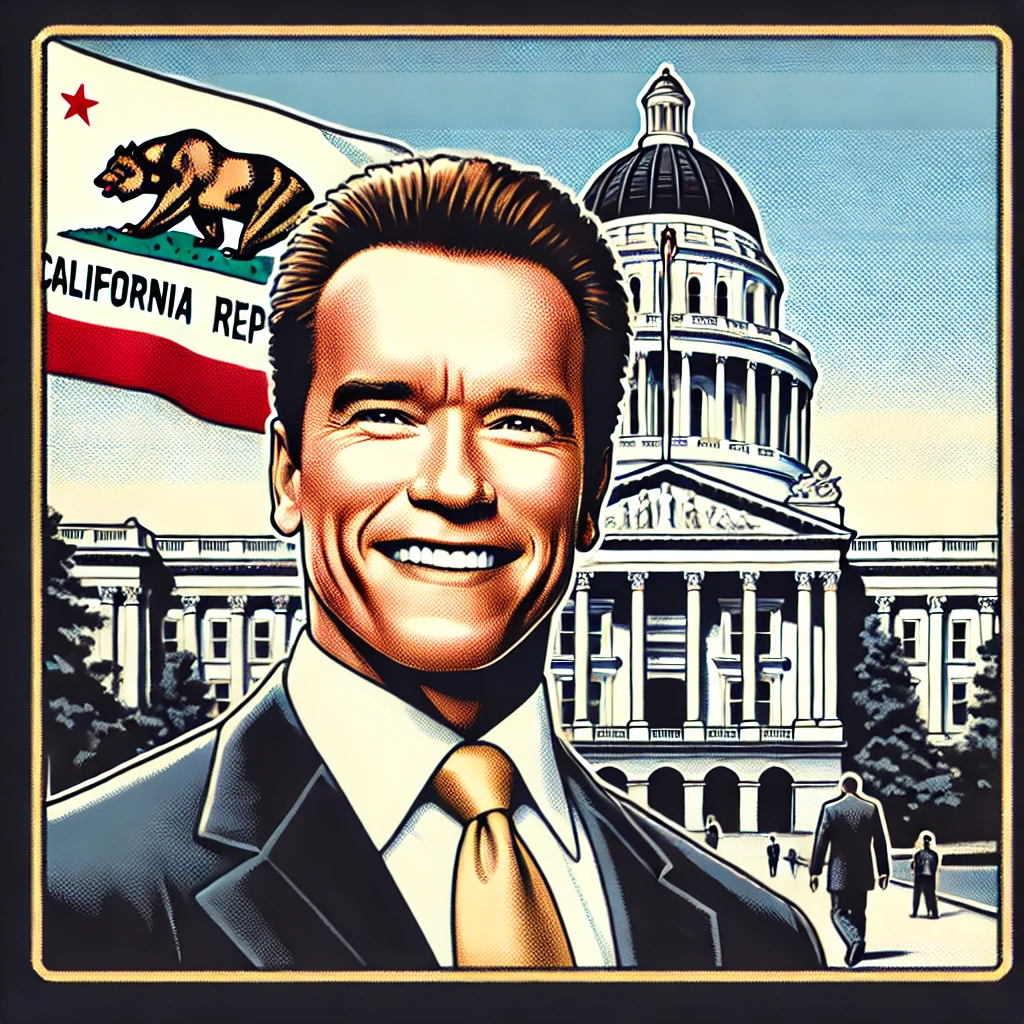On November 17, 2003, Arnold Schwarzenegger, internationally known as a Hollywood action star and former bodybuilding champion, was sworn in as the 38th governor of California. His inauguration marked a rare transition from a career in entertainment to the highest political office in the state. Schwarzenegger’s candidacy and election were unique, spurred by an unexpected recall vote against then-Governor Gray Davis. The recall, driven largely by a wave of public dissatisfaction over budget issues and energy crises, was a rare event in American politics, particularly for a state as prominent as California. Schwarzenegger, with his larger-than-life persona and straightforward promises of reform, quickly gained traction among Californians who were eager for a fresh start and a break from traditional political figures.
Schwarzenegger’s platform focused on financial recovery, economic stimulation, and cutting through bureaucracy—issues that resonated widely with voters frustrated by California’s $38 billion deficit and rising unemployment. His message was clear: he promised to “clean up the mess” and bring economic stability back to California. Despite being a political outsider, Schwarzenegger leveraged his fame and charisma to secure a sweeping victory in the recall election, capturing more than 48% of the vote in a crowded field of candidates. His election served as a powerful demonstration of the populist appeal that celebrity figures could command in American politics.

California’s Challenges and Schwarzenegger’s Reforms
Upon taking office, Schwarzenegger faced significant challenges. California’s financial woes, exacerbated by the dot-com bust and an energy crisis, required immediate attention. Schwarzenegger approached these problems with a mixture of bold reforms and bipartisan cooperation. One of his first actions as governor was to roll back a recent increase in the state’s vehicle registration fee, a measure that had been particularly unpopular. However, this decision also meant a reduction in state revenue, complicating the budget issues Schwarzenegger was tasked with resolving.

To address the budget deficit, Schwarzenegger sought new ways to manage California’s finances without raising taxes—a key promise of his campaign. He introduced several measures aimed at curbing government spending and boosting efficiency. Additionally, he advocated for initiatives to stimulate job growth, streamline regulatory processes, and encourage investment in infrastructure. While these initiatives faced opposition, particularly from entrenched political factions, Schwarzenegger’s ability to reach across the aisle allowed him to build coalitions and push through critical reforms. His efforts underscored a commitment to pragmatic governance and a willingness to navigate the complexities of California’s political landscape.
The Legacy and Impact of Schwarzenegger’s Governorship

Schwarzenegger’s tenure as governor had lasting impacts on both California and the broader political scene in the United States. Despite mixed results in his efforts to balance California’s budget, he left an indelible mark on the state’s environmental policy. Schwarzenegger signed the Global Warming Solutions Act of 2006, making California the first state to set limits on greenhouse gas emissions. This landmark legislation not only influenced state policy but also set a precedent for other states and countries. Schwarzenegger’s commitment to environmental issues, which continued long after his time in office, helped establish California as a leader in climate change policy and sustainability.
Moreover, Schwarzenegger’s governorship showcased the potential for celebrities to transition into politics, foreshadowing future campaigns by high-profile figures. His success demonstrated that a candidate’s charisma, ability to connect with the public, and fresh approach could sometimes outweigh political experience. Though his tenure saw both successes and controversies, Schwarzenegger’s governorship remains a compelling example of how non-traditional candidates can impact governance and policy. Today, Schwarzenegger’s environmental advocacy, combined with his efforts to foster bipartisan dialogue, reflects his lasting influence on California’s political and social landscape.
Schwarzenegger’s role as governor of California also emphasized the importance of adaptability and resilience in leadership. As a figure who had achieved success in multiple arenas, Schwarzenegger’s ability to pivot between drastically different roles—from bodybuilding and acting to political leadership—served as an inspiration for many. His governorship challenged traditional political narratives, encouraging a broader perspective on who can lead and the unique strengths that diverse backgrounds can bring to governance. His time in office continues to be studied as a case of unconventional yet impactful political leadership.
